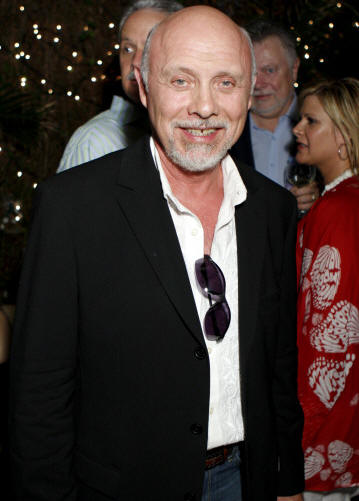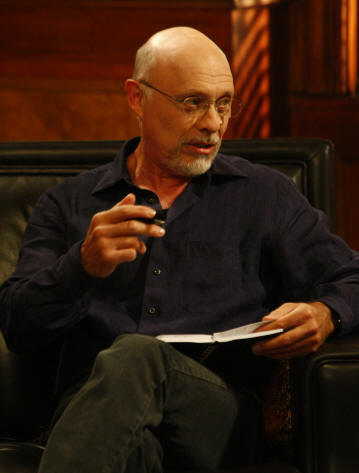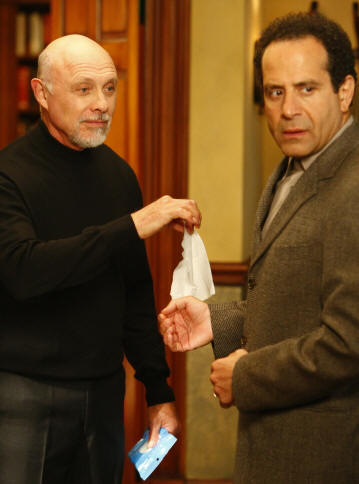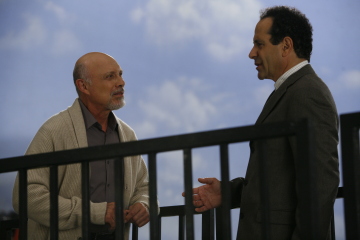We have come to expect brilliant acting from Hector Elizondo Ė and since
1960, he has rarely disappointed. Elizondo has been on screens and
stages all over the world for over forty years, though he seemed to pop
up on most of the publicís radar for a supporting role as a kindly hotel
manager in a surprise smash hit in 1990.
Joking that the popular Julia Roberts/Richard Gere romantic comedy
Pretty Woman
was not his first try at acting, this charismatic veteran actor says, ďI
always laugh when people say, ĎI remember you from
Pretty
Woman.í
My goodness,Ē he says, ďI was already in the business for 30 years by
then.Ē
Born and raised in New York, Elizondo has perfected his acting skills in
hundreds of theatrical, television, film and radio roles. These include
his 1969 Obie Award winning role in
Steambath,
his spine-tingling portrayal of Mr. Grey in 1974ís hit
Taking of
Pelham One-Two-Three.
Elizondo has also become prolific director Garry Marshallís good luck
charm Ė appearing in all sixteen of his movies. Elizondoís television
credits include appearances on old favorites like
All in the
Family, Maude, Columbo,
Kojak
and
Baretta,
as well as appearing in 141 episodes of
Chicago Hope.
Elizondo was truly heartbroken earlier this year after the cancellation
of
Cane,
a spicy, short-lived TV drama in which he portrayed the patriarch of a
powerful Latin family running a rum business. Unfortunately,
Cane
never really found its audience and while dealing with his
disappointment, Elizondo had planned to take a little break from TV.
However following the tragic death of actor Stanley Kamel, Elizondo is
now back in series work, fluffing the cushions on his couch for Tony
Shalhoubís neurotic, obsessive and compulsive character in the popular
series
Monk.
Elizondoís charm and kindness are infectious and he is truly one of the
good guys in Hollywood. Recently, Elizondo took some time out of his
busy schedule to give us a call and talk about his nearly 50 years in
acting, the new role on Monk and to make a passionate plea for us
to all re-evaluate the role we are playing in the destruction of our
environment and the planet.
Hello, Hector! How
are you?
Okay, my darling. ListenÖ if we have a
little interference itís because I am on a car phone.
Thatís fine.
I donít have my phone to my ear so I am not breaking the law. But,
you are coming loud and clear through my speakers.
 Oh
great.
Oh
great.
And where are you calling from, my dear?
Iím in Philadelphia.
Oh, Philadelphia. My granddaughter is going to school at Haverford
College.
Oh, wonderful.
Thatís a lovely area.
Yes, she is a Haverford girl. She wants to be a constitutional lawyer.
Oh, good for her.
Yes, I have a very precocious granddaughter. Thank goodness.
Oh, she sounds
wonderful.
Yeah. I might need a lawyer in the future.
Hey, everyone needs
one in their family, right?
(laughs)
Well anyway, so you are in Philadelphia? Good deal. I spent some
wonderful times there when I was doing out of town Broadway tryouts. In
fact, I was there when I was doing Sly Fox with George C. Scott
in 1978 or Ď77.
Itís a beautiful
area.
Iím from the New York theatre so I we used to go to Philadelphia a lot
to do Broadway tryouts. And I love Pennsylvania.
Oh great.
Yeah, like the Amish Country. So, what can I do for you today?
First of all... I am really thrilled to be able to speak with you and
ask you some questions about your career and what you are doing now.
You have now been acting over forty years. When you started out, could
you have ever have imagined that you would still be making a living at
it after all these years later?
No, of course not. As a matter of a fact, I didnít think that I would
last or live this long quite frankly. (laughs) No. This was
not part of my plan. I didnít start in the business as a frivolity. I
started because I loved theatre. I was trained in the theater Ė like
everyone in my generation was. But, I never thought about the future.
I thought of the projects that I would do next and about the authors or
playwrights whose work Iíd love to perform Ė such as Arthur Miller and
William Shakespeare and Tennessee Williams. You know, all the great
playwrights of the 50ís and 60ís. So, we were pure actors Ė which is
one of the reasons I did Monk, because Tony is a theater person.
Heís a generation behind me, a much younger man, but he has the same
credentials, so I feel very comfortable with that.
 Youíve also been
married for about 40 years, which is itself is pretty amazing in
Hollywood. Do you feel that your home stability made it easier to
focus on your career?
Youíve also been
married for about 40 years, which is itself is pretty amazing in
Hollywood. Do you feel that your home stability made it easier to
focus on your career?
Yeah. But I never really thought about my career too much and maybe I
should have taken care of it more. Perhaps. I have a feeling about a
career. Itís like another moving part, a part that you have to take
care of. Iíd rather think of myself as having jobs. Some jobs you have
are better than others. (laughs) And you meet some lovely
people along the way. Career wasnít something I thought about too
much. Honestly, in the formative years, I actually thought I was
working for writersÖ for authors. What creates stability I think is a
stable person Ė someone who has the right sense of values. Fortunately
for me, I come from a particular time, a generation where your value was
predicated on how good your work was and what kind of person you were.
Itís a working class ethic that I brought into my profession. And I
never changed. The main thing is to never take yourself seriously and
think that because you are doing well and are recognizable in this
profession or any others that you are successful. To me, the definition
of success is oneís capacity to love. If you donít have that, then you
are not successful. No matter how many toys you have. I was lucky that
I never measured myself by the toys I had.
Back in the 70ís, you were one of the first actors with a Latino
background to have found such success and acceptance. Do you think it
was harder for you as a Latino male then others actors trying to make
it?
Well in the theater, it wasnít an issue for me thank goodness. But
later on in TV and movies it sometimes became an issue. Usually though,
if I could get an in-person interview, I could get the job. Fortunately
for me again, being theatre trained and having the kind of look I have Ė
which is a very neutral look Ė I can play any nationality whatsoever,
including the accentsÖ because I specialize in accents. I was available
for all sorts of possibilities. I do comedy and drama. When you bring
those things to the table, there are always possibilities. I was very
lucky. I didnít suffer some of the barriers that other actors
suffered. Maybe it was the time I was doing itÖ back in the 60ís in the
theater; it was not the same thing. Also, I never thought of myself as
a Latin actor. We donít think of ourselves as our nationalities. My
nationality is American. My parents are from Spain and Puerto Rico but
I am a New York City born-and-bred guy. I never compartmentalized
myself like that. Just as Al Pacino never thought of himself as an
Italian actor and Bueller never thought of himself as a German actor.
So, I didnít like that category. I think that putting yourself in the
box like that or having people put you in a box like that limits your
opportunities.
You have played so
many legendary roles over the years. Do you have any favorites?
When you ask that question, I immediately think of stage. I won the
Obie Award for Steambath and interestingly, that was the first
Latino I ever played. (laughs) And he was God. Iíve since
played God four times. The first person I played with a vowel at the
end of his name and I was supposed to win an Obie Award for best actor
in 1970 in New York. I started acting in 1960, by the way. As far as
movies are concerned, Iíd have to say Young Doctors in Love,
which was Garry Marshallís first movie. Pretty Woman was of
course a delight to do. The iconic 70ís movie The Taking of Pelham
One-Two-Three was one of the best movies of the 70ís. Itís become a
classic and is one of my favorites.
Youíve been in almost all of Garry Marshallís movies. How did you start
working with him and why do you feel he keeps coming back to you?
I havenít been in almost; Iíve been in all of them. It is sixteen
movies. Well, I guess youíd have to read his autobiography, Wake Me
When Itís Funny. I know I have to read it in order to find out.
(laughs) I canít tell you why but we are good friends and also
speak the same creative language. I like his mind. I like his funny
brain. I like the way he works and the attention he pays to the actor
and the respect he has for them. Heís a very funny and kind man. He
brings a lot of humor and kindness to a set. He doesnít shoot a movie
so much as he throws a movie. You have a lot of fun. Itís like a party
when you do a movie with him, in spite of the fact that movies arenít
really a lot of fun to do. Not fun at all. They are a lot of work. We
are going to do our seventeenth movie in the near future, Iím sure.
 Early on in your
career you played a lot of bad guys Ė like in
The Taking of Pelham
One-Two-Three and your acclaimed guest role on Kojak. Now it
seems you play mostly nice ones. How do think that has come about? Do
you miss playing the bad guy roles?
Early on in your
career you played a lot of bad guys Ė like in
The Taking of Pelham
One-Two-Three and your acclaimed guest role on Kojak. Now it
seems you play mostly nice ones. How do think that has come about? Do
you miss playing the bad guy roles?
AhÖ I think Pretty Woman ruined the bad guy stint for me. I
loved playing villains but I donít get a chance to play them anymore. I
think most actors probably prefer playing villains. They are more
interesting but I donít seem to get that chance anymore.
When you were making
a little movie called
Pretty Woman,
did you have any idea that it would have become such a phenomenon?
I think everyone was surprised. No one can ever tell with that. You go
to work. You work hard and put in your twelve, fourteen, fifteen hours
a day and itís out of your hands. But then sometimes you turn around
and you can only feel very grateful. You think: how about that? Not
only did people like it, they loved it. Then it became this iconic
movie. It was quite startling to us. We were very, very happy and very
grateful for it.
Last year you were in the TV series
Cane. I really liked it and was disappointed it didnít get more of a
chance to find an audience. Were you surprised it wasnít pushed harder?
Cane
was a wonderful show. It was my favorite show I have ever been in. It
was everyoneís favorite show and we were disappointed and stunned. The
writersí strike ruined it for us. They were ready to pick it up for
another nine or ten and then the strike broke the momentum and it was
just too much money for them.
Yes, that was so
disappointing, because it was a wonderful show.
It was awful. It was a terrific, quality show with great nuances and
great regional sense to it. I mean you could smell the coffee and smell
the rum, you know? We were actually brokenhearted over it.
You have just
joined
Monk,
which is going into its seventh season. How difficult is it coming in to
a series that is so established Ė particularly because you have to
replace such a beloved character?
Well, itís always a challenge to walk into a family like that. But,
with someone like Tony and with the kind of environment heís helped to
create, itís no problem to me. Iíve never had a problem unless people
are very mean. Tony is one of the nicest people in the industry and a
true professional. The environment was really terrific and I actually I
know half the people there, since Iíve worked for so many decades. I
know half the crew and the actors and it took me about three-and-a-half
minutes. It was a challenge at first thoughÖ knowing I was following
such a beloved actor, but now we are part of the family and playing a
different kind of fellow.
The producers of
Monk
said that you were their first thought when they realized that they had
to replace Stanley Kamel. How flattering was that?
Well, I was delighted. In fact, Tony himself called me and that sort of
sewed it up for me because I wasnít looking to come back to television.
In fact after Cane, I wanted some time off because it was so
disappointing. I was feeling the pain, you know? Especially for Jimmy
Smits, who worked so hard. He really, really, really worked hard. Heís
a terrific actor and person and it was a heartbreaking experience, so I
wasnít ready to jump back on the horse. But when this came along, this
was special. I do a scene a week. Thatís something I can handle.
 How familiar were you
with the show before you were approached to join?
How familiar were you
with the show before you were approached to join?
Well, I knew the show. I donít watch television that regularly but
Monk of course I knewÖ because again, everybody watches Tony. Tony
is the kind of actor that you go out of your way to see. So, I knew the
show somewhat. It was Tony Shalhoub that really turned the corner for
me.
Tony Shalhoub has created such an interesting, eccentric character.
Whatís it like playing against him? Do you ever fear you may crack up?
Oh, I think weíve done that a couple of times. Whatís wonderful about
playing with Tony is that with him itís always fresh. Heís always
working on the character like itís the first week of shooting. You
wouldnít think that heís doing this going on seven years because heís
always fresh and enthusiastic about what he does. Thatís what rubs off
and he still laughs about the character, and so do I. A couple of times
we do have to stop shooting the scene because we were laughing so hard.
Itís definitely the most indelible character since Columbo and
Peter Falk.
Iím expecting to get a screener of your first episode in the next day or
so, but I havenít seen you on the show yet. Tell me a bit about your
character.
Well, Iím of course the new Psychiatrist Ė who was a friend of
Psychiatrist who passed away. He knows Adrian and he knows the
syndromes and his issues. Being a different kind of man, heís
determined that heís going to turn the next page on Monkís
rehabilitation. Heíll approach it somewhat differently. Heís going to
push the envelope with Tony a little bit. Heís going to push Tony to
deal with some of his issues. But down the road, you never know if heís
going to be the therapist or if Iím going to be the therapist. I hope
you get to watch the first show. The characters are very different. My
studio is warm and woody and brown and very bookish and I think my
character comes from a non-academic background who loves jazz, loves
music. Heís a self-educated guy. A different kind fellow.
Will you be in all of
the episodes this season?
Well, I think Iím going to be in nine or ten of the sixteen to begin
with. Then weíll see how it goes.
I hear that you are
active in trying to revive radio drama as an art form. How did you get
involved with this? Why do you think it is so important?
Iíve been involved with radio since I was a kid. I was a founding
member of the Los Angeles Theater Works, LATW radio group. Twenty-five
years ago we formed it: myself, Richard Dreyfuss, Susan Sarandon, JoBeth
Williams and a bunch of other wonderful people. We are the premier
radio group in America. We have recorded over 200 shows for us and also
many shows for the BBC, which is the premier radio outlet in the world.
Radio drama is very important to me because it is a pure actorís
medium. Itís a pure writerís medium, because in radio, you deal with
the text and with the writing. Not with your personality or whether
youíre cute or the flavor of the month. Youíre telling a story. Youíre
a shaman. You disappear. It doesnít matter what youíre wearing. You
are creating and you use your imagination. I think radio is an
incredible imaginative tool, a great outlet. Thatís why all the British
actors [do radio], because they love text. All British actors, no
matter how famous they are, all do radio. They deal with language.
Language is the architecture of thought. Thatís when you get the best
writing. Itís like doing a play without being on stage. Itís very,
very exciting. Itís also quite fun. You can actually do a radio
broadcast and get together War and Peace, for example, where you
could never do that as a movie. It would cost too much and it would
never get off the ground. On radio, itís possible.
Thatís fascinating.
Yeah. I just did radio this morning actually. Radio is a very, very
important form of creative expression for me.
You have worked in
theater, film, television and radio. Do you have one you prefer?
I prefer the venue where the text is better Ė the writing is good. When
the writing is good, you will find that you are very, very satisfied.
Whether it is radio, it is film, if it is theater or television if the
writing is good, and the producers are good Ė which means that they
hired the right people and the atmosphere is good Ė then itís great.
Sometimes you can do theater, for instance, and have a terrible
experience because itís a bad play. So again I must say the text is the
thing.
I read that you are a talented guitarist and singer. Do you ever get to
use those skills in your acting or private life?
I have. If you seen
some of Garry Marshallís movies, Iíve played guitar in Young Doctors
in Love. I sung on The Other Sister. I love jazz. Jazz is
the way I think and I feel. Iíve been involved with music since I was a
kid.
Do you enjoy adding
your passion for music into your acting?
I guess I put it in without even realizing. Just in the way I walk.
(laughs) Thereís just something about me that exudes jazz. People
say, ďHow did I know that you loved music?Ē Itís just in my speech, my
abilities. I love all music. I love classical music. I adore
classical music. I am a music lover. I go to Chamber Concerts and I go
to Symphonies. I love Afro/Cuban music because I think thatís the most
exciting music of all. So, music is the way I float.
What would people be
surprised to know about you?
Letís see. What would they be surprised by? Oh, I love wilderness. My
idea of a hot time is a pair of binoculars and a beautiful trail and
looking at wildlife and flowers. I have a Zen Buddhist kanji on my
wall, a Zen-Buddhist calligraphy that says, ďSilence is like a clap of
thunder.Ē I think that the silence of the wilderness is like a
deafening roar to it. Itís a very wonderful place to be and I think we
are slowly ruining the world for our children and future generations.
It saddens me everyday.
It saddens me
too. I have two young children and breaks my heart to see what we are
doing to the world.
To this world and our fellow creatures. Other animals. We are not the
only animals in this world. We are the most powerful and the most
greedy. And we seem to want more than we need always.
How would you like
for people to look at your body of work?
That I usually turned a silk purse into a sowís ear. (laughs)
No really, itís the other way around. I turned a sowís ear into a silk
purse; in other words, I did the best with what I had. I took advantage
of my opportunities. I tried to be a true professional and all
inclusive while working well with all people. In a work sense, by never
poisoning my environment with a bad attitude or bad work or just being a
person who is self-evolved.
Are there any
misconceptions youíd like to clear up?
Some people donít know that Iím from New York City, born and raised.
They also donít know that the name Elizondo is really a Basque name.
Elizondo is one of the oldest Basque names and it means ďat the foot of
the church.Ē The Basque country is in the north of Spain and in the
South of France. Iím from New York City and my folks are from Puerto
Rico and fatherís people are from the Basque country. And also, some
people think, are you 5í2Ē? (laughs) Itís ridiculous! And yes,
those blue eyes are mine, not contacts!
I really appreciate you taking the time to speak with me.
One more postscript Ö one of my most important involvements is keeping
this planet from rapacious, greedy human beings. Itís a terrible thing
we are doing our planet and we have to stop it and we have a chance to
at least slow it down.
Letís hope that there
are millions of others who feel the same way so we can finally stop
doing some of the harm and the damage we are doing to this world.
Thatís right. Itís only everything, right?